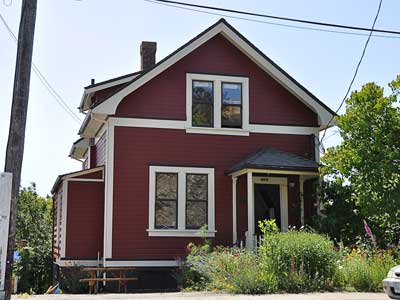ARCHITECTURE:
This front-gabled, 1½ storey Vernacular house has an interesting configuration of frieze boards under enclosed eaves that continue across the gable as a beltcourse through the second-storey window frames. Whalebone bargeboards frame a shingled gable with a slight pent roof over the beltcourse; the first storey is clad with drop siding and corner-boards. A shed-roofed, shingle-clad wall dormer on the left side has a brick chimney in its roof. There are two double 1-over-1 sash windows with horns in the front, and smaller similar single windows on the left side and the dormer. A cantilevered, shed-roofed bay on the right side has a stained-glass window; an enclosed entry porch at the back of the left side appears to be a later addition. There is a small, hipped-roof entry porch at the right front with plain square supports. The gable of the house suggests an attempt at Queen Anne details, and it is possible that other original details may have been lost.
ORIGINAL OCCUPANTS:
This house was built in 1911 by Frank and Mary Ross on the back of their property, originally 146, now 166 Eberts St, which they purchased from John Douglas, the son of Sir James Douglas, in 1905. Francis Henry Ross (1867-1952) was born in Victoria in the family farmhouse to Alexander Ross and Mary Ann Bastian (his sister Flora lived at 204 Memorial Cr, Fairfield). His grandfather was HBC Factor Charles Ross, who oversaw construction of Fort Victoria in 1843. Charles died in 1844 and wife Isabella left the area. However, she returned in 1853, bought land in the area of what is now the SE corner of Ross Bay Cemetery, and built a house with her youngest children. They established a small cattle farm which they called Fowl Bay Farm (sic). This gave the name to the bay east of them (now Gonzales), and the bay south of their farm was named Ross Bay after the family.
In the 1860s Isabella sold the farm to son Alexander and lived with him and his family. After Alexander died in 1876, the family was destitute, and Isabella went to live with the Sisters of St. Ann. Mary Ann remarried to James Lascelles, and Frank, who had attended Central School, was listed as a dairy farmer at the age of 13 in the 1881 census. In 1885 he became a painter, and worked at that trade for 60 years. In his old age he enjoyed telling the story of driving by horse and buggy through the woods to Esquimalt to paint Queen Victoria’s warships.
Frank’s mother died in 1888 at 38 of tuberculosis and he lived with his stepfather James until James died in 1892. By 1895 Frank had formed a partnership with F. Smith as Ross & Smith, Painters & Decorators, with a paint supply store at 102 Fort St. He lived at 141 Eberts St (Fairfield) until about 1903, when he married Mary Bertha Zender (1887-1961), who was born of German stock in St. James, MN. Frank and Mary built 166 Eberts St in 1907, where they lived until their deaths.
OTHER OCCUPANTS:
By 1913 City of Victoria employee Robert Paterson (1873-1957) purchased this property. Born in Baillieston, Scotland, Robert came to Victoria in 1910. His wife was Katherine Pollock. He lived in this house until 1921, then moved to Terrace, BC, where he died. Daughter Martha B. Paterson owned the house in 1933-34, and married Walter Leland Eaton in 1936. By 1939 the owners were Charles Newton (1884-1943) and Beatrice May (Couzens) Green, from Ireland and England, who married in Victoria in 1923. Charles was a gardener with A.J. Woodward & Sons and later a janitor. Beatrice still lived here in 1951.

